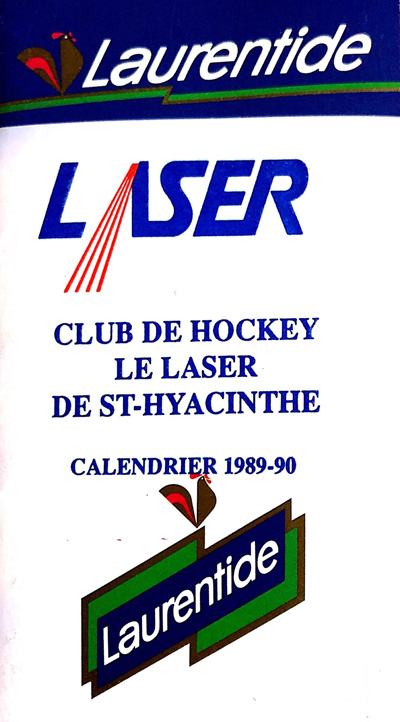Quebec Major Junior Hockey League (1989-1996)
Tombstone
Born: June 23, 1989 – The Verdun Junior Canadiens relocate to Saint-Hyacinthe, Quebec1Zurkowsky, Herb. “Era comes to end as Canadiens sell junior hockey team”. The Gazette (Montreal, QC). June 25, 1989
Moved: April 25, 1996 (Rouyn-Noranda Huskies)2NO BYLINE. “Sports Shorts”. The Gazette (Montreal, QC). April 26, 1996
First Game: September 22, 1989 (W 2-1 @ Shawinigan Cataractes)
Last Game: April 9, 1996 (L 10-1 @ Granby Predateurs)
President’s Cup Championships (QMJHL): None
Memorial Cup Championships (Canadian Hockey League): None
Arena
Stade L.P. Gaucher
Opened: 1937
Ownership
Owners:
- 1989 – ????: Jacques Gingras, Fernand Fontaine, Claude Lemieux & Carmen Lemieux
- ????-1995: Michel Gaudette, Claude Lemieux & Stephane Lemieux
- 1995-1996: David Morin & Sylvain Danis
Sale (1989): $300,000 Montreal Canadiens to Gingras, Fontaine, Lemieux & Lemieux
Sale (1995): $650,000(Lemieux, Lemieux & Gaudette to Morin & Danis)3Zurkowsky, Herb. “As the league turns”. The Gazette (Montreal, QUE). May 9, 1995
This Fun While It Lasted entry was written by long-time contributor Hoffman Wolff.
Background
Remembered mostly for being NHL Hall of Famer Martin Brodeur’s junior team, the Saint-Hyacinthe Laser was a shaky Quebec Major Junior Hockey League entry from 1989 to 1996.
Throughout the league’s history, QMJHL clubs in the Montreal area have struggled to attract fan and media attention in the shadow of the NHL’s mighty Canadiens. That has never kept anyone from trying to make it work, though, as countless clubs have flitted in and out of Montreal proper as well as suburbs such as Laval, Longueuil and Verdun.
The Habs (and Quebec Nordiques) have occasionally operated their own QMJHL squads. However, as the NHL club doesn’t gain any special rights to the junior team’s players by owning the team, the benefits for the big club are rather nebulous. In the spring of 1988-89, the Canadiens were looking to wash their hands of their QMJHL club, the Verdun Junior Canadiens, after a wretched year which saw the team go 12-56-2 and draw a paltry 834 fans per game.
The days of placing QMJHL teams in far-flung locales were still a few years off, so the league stuck to the usual script and went into another small arena in the Montreal orbit. A group of local investors in Saint-Hyacinthe (pop. 55,000), an agricultural hub 35 miles east of Montreal, purchased the club in June 1989 and moved it to the 2,000-seat Stade L.P. Gaucher. Ownership picked out the “Laser” nickname, with the logo rather unimaginatively slapped onto the Canadiens’ bleu-blanc-rouge uniform template.
In Competition
The Laser’s debut season of 1989-90 was its best. Martin Brodeur, then 17 years old, earned All-Rookie team honors. At the end of the year, the Laser’s bested the Trois-Rivieres Draveurs in the first round of the QMJHL’s President’s Cup playoffs before falling to the top-seeded Victoriaville Tigres in the semis. The Laser’s first round victory would prove to be the only playoff series win in the club’s six-year history.
Brodeur would end up staying for three seasons. In his final season of 1991-92, the Laser also featured the QMJHL’s top three scorers with Patrick Poulin, Charles Poulin (no relation) and Martin Gendron. But the season ended in what would become the Laser’s customary fashion, with a first round playoff exit. Between 1991 and 1996, the Laser would fail to survive the QMJHL quarterfinals five times and fail to qualify altogether once (in 1993).
A grim incident took place in October 1994. 18-year old forward David-Alexandre Beauregard lost an eye after an errant high stick from Xavier Delisle of the Granby Bisons slid underneath his face shield. A San Jose Sharks draftee, Beauregard’s NHL dreams immediately vanished. The NHL does not permit players who are blind in one eye. Remarkably, Beauregard not only returned to the Laser later in the season, he continued to play junior and professional hockey for another eighteen seasons for a rather astonishing array of teams and leagues.
Departure
The commitment of various Laser owners to Saint-Hyacinthe remained an open question throughout the early 1990’s. In April 1991, the club leveraged a $500,000 offer from potential buyers that would transfer the club to Sherbrooke in order to get better lease conditions from the city of Saint-Hyacinthe.4“Les chances du Laser de rester ou de partir seraient de l’ordre de 50-50”. Le Courrier, April 24, 1991
In April 1994, majority owner Michel Gaudette told the QMJHL that the Laser would not return to Saint-Hyacinthe.5“Team hitting the road?” The Record, April 26, 1994 Gaudette attempted to relocate to Moncton, New Brunswick even if his team had to share the Moncton Coliseum with the AHL’s Hawks. But no one apparently told the Hawks. They had little use for the interloper junior squad and refused to even enter negotiations with the Laser.6“Le Laser ne va pas à Moncton.” Le Soleil (Quebec City, QC). June 2, 1994. The Laser ended up back in Saint-Hyacinthe for 1994-95.
Montreal-area businessmen Dave Morin and Sylvain Danis purchased the Laser for $650,000 in the summer of 1995. Claiming that they would lose $200,000 during the 1995-96 season, they soon started shopping the team around.7“Nous n’avons rien signé avec Rouyn-Noranda”. Le Courrier de Saint-Hyacinthe (Saint-Hyacinthe, QC). March 5, 1996. The owners soon set their sites on Rouyn-Noranda, a remote mining community seven hours northwest of Montreal. With the QMJHL finally starting to shake off the geographic shackles that had tethered it to the Montreal-to-Quebec-City corridor for decades, the move was approved in April 1996, less than a year after Morin and Danis had purchased the team.
Aftermath
The Rouyn-Noranda Huskies are still league members as of this writing, winning the 2019 Memorial Cup as the Canadian national champions of major junior hockey.
Goaltender Martin Brodeur (Laser ’89-’91) played parts of 21 seasons with the National Hockey League’s New Jersey Devils. He retired from the NHL in 2015 as the league’s all-time goaltending leader in regular season appearances (1,266), wins (691) and shutouts (125). Brodeur earned election to the Hockey Hall of Fame in 2018.
##

